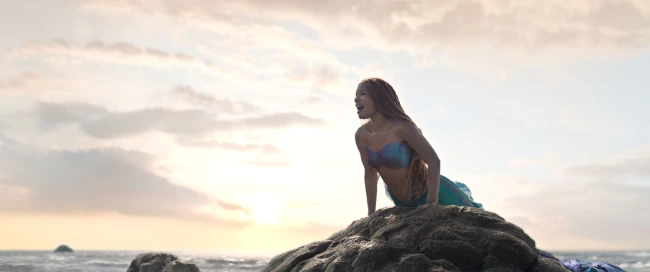Image: Movie cover art | Photo Credit/Disney
As the Disney corporation continues to painstakingly remake their animated catalogue for financial gain first and artistic advances second (exclusively in that order), their new live-action iteration of The Little Mermaid, the 1989 classic that spawned a new creative renaissance for the studio in the late twentieth century, begins with a promising note that may signal a movie separate from empty commercial replication. Against the backdrop of sweeping oceanic waves, a pithy quote from the original Hans Christian Anderson story seeps onto the screen: “…but a mermaid has no tears, and therefore she suffers so much more.”
This epigraph, pulled from a text distinctly bleaker than the jubilant animation, and the live tableau seem to paint a necessary expansion of the fanciful ’89 tale with more somber shades to ground the story in its latest format. But just as the sea’s contents ebb and flow, the trite and tired trappings of Disney’s remakes encroach upon what is a fresh spawning point. Like so many of these “movies” (a term I use loosely since “cash grab” is often more apt), perfunctory recreation and anonymous filmmaking begin to accumulate in The Little Mermaid like a tsunami, but some thoughtful revisions and a breathtaking breakout turn from its star nobly tread against these treacherous waters.
It’s one of the prototypal fairytales, but let’s recount the synopsis to strum those nostalgia strings, just like the Mouse House so aspires. Ariel (Halle Bailey, absolutely stunning), a plucky adolescent mermaid, yearns to be human and bask in pleasures that solely exist on land, but she is stifled and misunderstood by her stoic father King Triton (Javier Bardem). Pining for the dashing Prince Eric (Jonah Hauer-King), she makes a deal with a conniving sea witch named Ursula (Melissa McCarthy), trading her voice for a pair of legs. The catch? If Ariel doesn’t secure a “true love’s kiss” from Eric in three days, she will be transformed back into a mermaid and belong to Ursula forever.
Understandably, the perceived optics of this narrative- romanticizing a girl chasing a boy and prioritizing appearance over her literal and figurative voice- are outdated to many, so a remake with more modern sensibilities was promising, though the choice of director Rob Marshall, whose mixed track record includes the dazzling, Best-Picture-winning Chicago but also more middling Disney efforts like Pirates of the Caribbean: On Stranger Tides, Into the Woods and Mary Poppins Returns, didn’t seem like it would be conducive to that revitalization.
What has particularly hampered these remakes is that their adaptation strategy is fundamentally counterintuitive in their exceedingly literal approach; the weight of the original films lied in their expressive animation, which often elevated broad fairytale trappings, and presenting these tales in flat live action yielded them as emotionally inert. Think of the grating photorealism in 2019’s The Lion King when Simba witnessed his father trampled to death by wildebeests and how the CGI replica of a lion cub, engineered to extensively resemble the real thing, was unable to truly communicate that anguish beyond its vacant visage. In this film, Flounder (Jacob Tremblay) especially takes the photorealistic brunt, the chipper guppy reduced to an artificial eyesore with ironically soulless eyes, but fortunately Sebastian (Daveed Diggs) is rendered to have more expression and isn’t just, you know, a regular crab.
The original Little Mermaid especially hinges on a certain elan. With dynamic imagery replete with rich color and touching expressionism, there’s genuine emotional grandeur that makes it a simple yet stirring fable about a young woman struggling to forge her own path in a world that suppresses it, all conveyed through traditional storybook conventions. Marshall unfortunately encounters what I deem “the remake paradox” as the elements he is forced to retain are misaligned with this new medium.
Remember back in ’89 the whimsy burst from “Under the Sea” and “Kiss the Girl,” the perfidious playfulness embedded in “Poor Unfortunate Souls,” or the palpable melancholy felt in Ariel’s isolation in “Part of Your World”? Despite his pedigree in musicals, Marshall too often drowns in rote visuals and shoddy CGI, especially for the underwater sequences, to truly capture anything substantive; you’ll yearn for the aquatic realm of Pandora, since a similar underwater space was made with more rigorous craftsmanship in Avatar: The Way of Water. Amorphous blocking and murky backgrounds drain Ariel’s well of turmoil during her famous lament, and something like Sebastian’s ode to ocean life lacks that joyful vigor, instead opting for nondescript framing and empty creatures clearly derived from 1s and 0s. The moments where the movie mimics its predecessor simply pale in comparison; just like most of the performances beside the stellar Bailley, they’re mildly serviceable, vibrant and glossy even, but lack that spark of ingenuity.
If you can’t fulfill a story’s needs, you probably shouldn’t tell it, but The Little Mermaid is surprisingly thoughtful and even compelling when it deviates from the animated classic, seeking to broaden the tale into an almost Greta Gerwigian ethos: an all-encompassing, bittersweet portrait of adolescent desire and womanhood’s price. The most nuanced interpretation of the original (and the one I operate under as an ardent fan) is that Eric is simply the catalyst for Ariel’s pursuit of agency, and at 135 minutes, much of the extended runtime is allocated to fleshing out that relationship beyond a rosy romantic idyll as it impacts her actualization. Trading in himbo ruggedness for boyish charm, this iteration of Prince Eric is more on the budding Ariel’s playing field, feeling just as repressed as he is drawn to the sea like she is to land. Bailey and Hauer-King have sparkling chemistry as their characters affectingly meet somewhere in the middle, and their revised dynamic is actually inspired for the expanded scope.
This change is so invigorating that you wish the movie wasn’t tethered to the original, since others like Triton’s disdain for humans, stemming from their murder of Ariel’s mother, aren’t as fully developed. Some are even slightly contradictory: Is Ursula still a symbol of garishness who exerts toxic image standards onto Ariel that she must transcend, or does she now have deeper ulterior motives to usurp Triton’s kingdom? Many of the muddled visuals would have benefitted from a cohesive magical realism lens to complement the more grounded writing, too. There are striking wisps of that- a silhouette of Ariel erupting from the ocean, illuminated by the golden sun as her swinging hair finally feels the rapturous touch of above the surface; still confined in a mermaid’s body, she doggedly grasps a rock during the “Part of Your World” reprise; a lachrymose dress drifting behind as Ursula drags her back into the depths of the ocean- that get lost in the visual noise of empty mimicry.
As The Little Mermaid is polarized between recreation and revision, its luminous star luckily keeps both sides intact, buoying the film’s rough sailing. It doesn’t take long to realize the relative acting newcomer is note-perfect as Ariel, and that’s not just because of her angelic pipes; seriously, her poignant and searing rendition of “Part of Your World” came close to flooding my eyes with tears. Bailey not only has the affable, bubbly and downright magical presence of a storybook princess, but she also vividly captures both the naivete and unwavering resolve of this young woman as she asserts her voice, even when it is literally taken. It’s a sterling breakout turn that brings genuine weight and gravitas to this fresh live action interpretation, and even when the movie is entrenched in regurgitating what we’ve seen before, she serves as a scintillating and enduring focal point.
Those hoping that Disney’s latest remake would make a bigger splash may be disappointed; however, it is executed with a bit more integrity of vision than typical fare, even if this partially bold new take is inhibited from being fully realized. There are commendable bones of something more distinctive, but Bailey imbues it with enough vital flesh to make this outing worthwhile.
Grade: B-
The Little Mermaid is now available in theaters.


